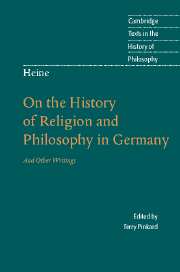Book contents
- Frontmatter
- Contents
- Introduction
- Chronology
- Further reading
- Translator's note
- On the History of Religion and Philosophy in Germany
- Other writings
- From a letter to Moses Moser in Berlin, May 23, 1823
- From The Songbook (1827), “Return home”
- From The Songbook (1827), “North sea: second cycle”
- From Lucca, the City (in Travel Pictures, Part IV, 1831)
- From the Introduction to “Kahldorf on the Nobility in Letters to Count M. von Moltke” (1831)
- From The Romantic School (1835)
- From New Poems (1844), “Poems of the Times,” “Doctrine”
- From the Letters about Germany (1844)
- From the “Afterword” to Romanzero (1851)
- From Confessions (1854)
- Index
- Cambridge Texts in the History of Philosophy
From The Romantic School (1835)
Published online by Cambridge University Press: 05 June 2012
- Frontmatter
- Contents
- Introduction
- Chronology
- Further reading
- Translator's note
- On the History of Religion and Philosophy in Germany
- Other writings
- From a letter to Moses Moser in Berlin, May 23, 1823
- From The Songbook (1827), “Return home”
- From The Songbook (1827), “North sea: second cycle”
- From Lucca, the City (in Travel Pictures, Part IV, 1831)
- From the Introduction to “Kahldorf on the Nobility in Letters to Count M. von Moltke” (1831)
- From The Romantic School (1835)
- From New Poems (1844), “Poems of the Times,” “Doctrine”
- From the Letters about Germany (1844)
- From the “Afterword” to Romanzero (1851)
- From Confessions (1854)
- Index
- Cambridge Texts in the History of Philosophy
Summary
Book One
Madame de Staël's work De l'Allemagne is the only comprehensive account the French have received of the intellectual life of Germany. However, since this book appeared much time has passed, and in the meantime an entirely new sort of literature has developed in Germany. Is it only a transitional kind of literature? Is it already in full bloom? Has it begun to fade? Opinions are divided on this issue. Most believe that with the death of Goethe a new literary period has begun in Germany; that along with him, old Germany has also gone to its grave; that the aristocratic period of literature is at an end, and the democratic period is beginning; or, as a French journalist recently put it, “The spirit of the individual has ended, the spirit of all has commenced.”
As for myself, I cannot make such definitive judgments about the future evolutions of the German spirit. However, for many years I have been predicting the end of what I was the first to call the “Goethean Period of Art.” I could prophesy with ease! I was well acquainted with the various strategies of those discontents who wanted to put an end to the Empire of Goethean art; some even claim to have spotted me at the time taking part in the uprisings against Goethe. But now that Goethe is dead, I am overcome with a wondrous grief.
- Type
- Chapter
- Information
- Heine: 'On the History of Religion and Philosophy in Germany' , pp. 136 - 195Publisher: Cambridge University PressPrint publication year: 2007

